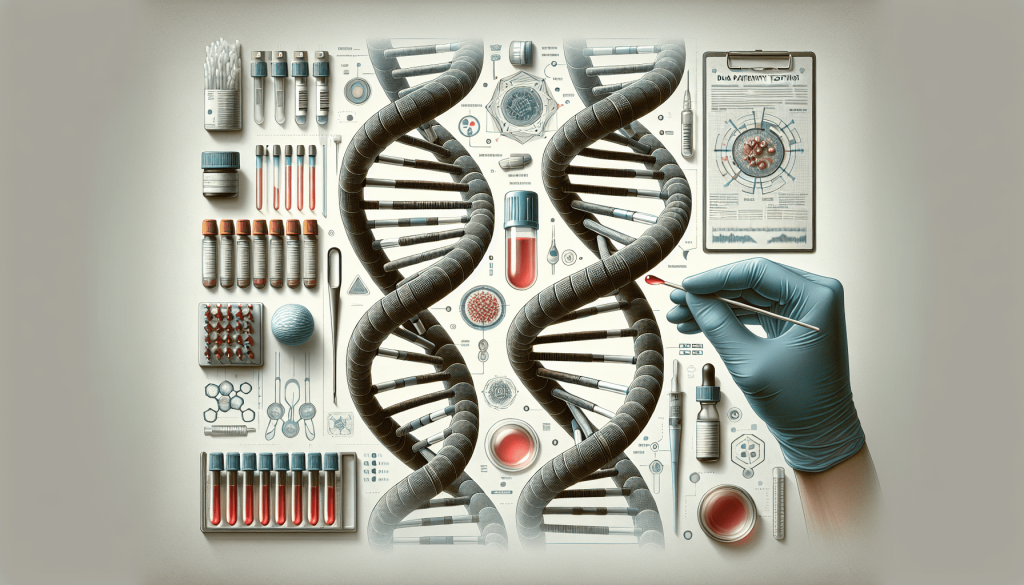Finding clarity and peace of mind has never been simpler with a local DNA paternity test. Your journey to uncovering the truth is supported by a range of trusted and accessible services near you, offering quick and accurate results. When questions arise about familial connections, you deserve reliable answers without the hassle. Let this guide help you navigate the world of DNA paternity testing, making the process straightforward and stress-free. Dive in to learn more about how to locate the closest and most reliable DNA testing facility to you. Have you ever wondered about the accuracy of your ancestry or the paternity of a child? Are you in need of a reliable “DNA paternity test near me?” If these questions resonate with you, then you’ve landed in the right place. This article is designed to guide you through the complexities and nuances of DNA paternity testing, offering you a friendly, comprehensive, and detailed exploration of what you need to know.

What is a DNA Paternity Test?
A DNA paternity test is a scientific method used to determine whether a man is the biological father of a child. By comparing the DNA sequences of the child, the suspected father, and usually the mother, you can determine with near-perfect accuracy whether there is a biological match.
How Does It Work?
The test involves collecting DNA samples, usually through cheek swabs, although other methods like blood tests can also be used. The samples are then analyzed in a lab to identify genetic markers that both the child and suspected father share. Because a child inherits half of their DNA from their biological father, if the markers align, it’s a match.
| Sample Collection Method | Commonly Used For | Ease of Collection | Accuracy | Cost |
|---|---|---|---|---|
| Cheek Swab | Home and Legal Tests | Very Easy | High | Affordable |
| Blood Test | Legal Tests | Moderate | High | More Expensive |
| Hair Sample | Ancestry Tests | Intermediate | Varied | Moderate |
Why Might You Need a DNA Paternity Test?
Paternity tests can serve multiple purposes, ranging from personal reassurance to legal requirements. Each reason has its specifics and implications, which makes understanding the “why” crucial before you seek a “DNA paternity test near me.”
Legal Reasons
There are many legal circumstances where paternity tests become crucial. These can include:
- Child Support: Courts often require a paternity test to establish a man’s obligation to financially support a child.
- Custody Battles: Determining paternity can influence custody agreements and visitation rights.
- Inheritance Claims: Proof of paternity can be essential for rightful inheritance claims.
Personal Reasons
Beyond legalities, there are personal reasons you might seek a paternity test:
- Peace of Mind: Knowing the truth can provide emotional closure and peace of mind.
- Family Medical History: Accurate medical history is essential for knowing genetic predispositions and health risks.
- Adoption and Reunion: Reuniting with biological parents or siblings sometimes warrants a paternity test to confirm relationships.
Ancestry and Genetic Heritage
Lastly, paternity tests can be part of broader interest in genetic heritage:
- Understanding Ancestry: Paternity tests can sometimes be bundled with other genetic tests to help map out your ancestry.
- Cultural Identity: Knowing your biological roots can help you connect with your cultural background.
Types of DNA Paternity Tests
Not all DNA paternity tests are created equal. Different tests serve different needs, and knowing which one is right for you is key.
At-Home Paternity Tests
These are simple and convenient. You order the kit online or buy it in a pharmacy, swab your cheek, and send it back to the lab. The results usually come in a few days.
Pros
- Convenience: Easy to collect samples from the comfort of your home.
- Privacy: No need for medical or legal entities to collect your samples.
- Cost: Generally more affordable.
Cons
- Legal Questions: Results often lack legal standing.
- Sample Integrity: The chain of custody is not regulated, which can sometimes lead to disputes.
Legal Paternity Tests
These are performed either at a clinic or laboratory where the collection follows strict chain-of-custody protocols, making the results legally admissible.
Pros
- Credibility: Accepted by courts and other legal entities.
- Regulation: Higher standards and regulated protocols reduce error.
Cons
- Cost: Generally more expensive.
- Convenience: Requires travel to a clinic or lab.
Prenatal Paternity Tests
Offered for expecting parents, these tests can determine paternity before the child is born. Samples are typically taken via blood tests from the mother and suspected father.
Pros
- Early Knowledge: Know the paternity before the child is born.
- Non-Invasive Options: Some methods are non-invasive and safe for both mother and fetus.
Cons
- Cost: Often the most expensive type of paternity test.
- Risk: Invasive methods carry slight risks to the fetus and mother.
| Test Type | Sample Source | Legal Standing | Risk Level | Cost |
|---|---|---|---|---|
| At-Home | Cheek Swab | Low | None | Moderate |
| Legal | Cheek Swab/Blood Test | High | None | High |
| Prenatal | Blood Test/Amniocentesis | Moderate | Varies | Very High |
Where to Get a DNA Paternity Test
After deciding the type of test you need, the next step is finding where to get it. Here’s a look at the main options available when you’re searching for a “DNA paternity test near me.”
Hospitals and Clinics
Most hospitals and clinics offer paternity testing services. These establishments are held to high regulatory standards, ensuring accurate and legally permissible results.
Advantages
- Accuracy: High levels of accuracy and credibility.
- Regulation: Compliance with legal and medical standards.
- Comprehensive Services: Additional medical services are available if needed.
Disadvantages
- Cost: Can be relatively expensive.
- Waiting Time: Sometimes long waiting times.
Private Labs
Private laboratories often specialize in DNA testing and might offer quicker turnaround times.
Advantages
- Speed: Faster results compared to hospitals.
- Specialization: Experts in genetic testing.
Disadvantages
- Cost: Can be costly.
- Location: Might not be as conveniently located.
Online Services
Many companies offer home testing kits that you can order online. Easy-to-follow instructions make this a popular choice.
Advantages
- Convenience: Easily order from home.
- Cost: Generally more affordable.
- Privacy: Conduct the test privately.
Disadvantages
- Credibility: Not always accepted for legal matters.
- Sample Integrity: No professional overseeing sample collection.

How to Prepare for a DNA Paternity Test
Preparing for a DNA paternity test isn’t particularly complex, but there are a few steps you should follow to ensure the process goes smoothly.
Choosing the Right Test
Firstly, decide which type of test suits your needs—home, legal, or prenatal. This will dictate your next steps.
Gathering Necessary Documents
If you’re going for a legal test, you’ll need to gather identification documents including birth certificates, IDs, and perhaps legal consent forms.
Sample Collection
For at-home tests:
- Clean Environment: Ensure you’re in a clean environment to avoid contamination.
- Follow Instructions: Carefully follow the instructions provided with the kit.
- Seal Properly: Once collected, ensure the samples are sealed properly before sending them to the lab.
For clinic-based tests:
- Appointment: Make an appointment and avoid eating or drinking at least an hour before the test (if it’s a cheek swab).
- Stay Calm: Some people get anxious during medical procedures—try to stay calm and collected.
Understanding Your Results
Once the samples are analyzed, you’ll receive the results, generally within a few days to weeks. Understanding these results can sometimes be daunting, so let’s break it down.
Probability of Paternity
Results are usually expressed as a percentage probability:
- 0%: The tested man is not the biological father.
- 99%+: The tested man is very likely the biological father.
Detailed Report
Many labs provide comprehensive reports:
- Genetic Markers: The report will detail the specific genetic markers that were compared.
- Explanation: An explanation detailing how the results were derived.
Emotional Repercussions
Receiving DNA results can bring a wave of emotions— from relief and happiness to disappointment and confusion. It’s important to prepare yourself mentally and emotionally for the possible outcomes.
Legal Implications of DNA Paternity Testing
A DNA paternity test can have significant legal implications, so understanding the context is crucial.
Child Support and Custody
Courts often use paternity tests to decide child support and custody cases. Having an accurate test is paramount in these situations. A legally admissible test means the results can be submitted as evidence in court and can influence custody decisions and support obligations.
Inheritance Rights
In cases of inheritance disputes, establishing paternity can mean the difference between securing an inheritance or losing it.
Immigration Cases
Some immigration processes might require proof of paternity, particularly when family reunification is involved.
| Legal Context | Importance of Test | Required Documents | Impact on Decision |
|---|---|---|---|
| Child Support | Very High | IDs, Birth Certificates | Direct |
| Custody | Very High | Legal Consent Forms, IDs | Direct |
| Inheritance | High | Will, Related Legal Documents | Significant |
| Immigration | Moderate | Visa Applications, IDs | Conditional |
Ethical Considerations
DNA paternity testing raises various ethical questions that you should consider.
Consent
It’s essential to get consent from all parties involved. Testing without someone’s knowledge or consent can lead to significant ethical and legal consequences.
Privacy
Privacy is paramount. Ensure that your results and process remain confidential and are shared only with relevant parties.
Emotional Impact
The emotional ramifications of DNA paternity testing can be extensive. Thi… z makes it vital to prepare and consider the consequences carefully. Psychological counseling might be beneficial in some cases.
FAQs about DNA Paternity Testing
Is the Test Painful?
No, most tests use cheek swabs, which are painless.
How Long Does It Take to Get Results?
Depending on the test type, it varies from 2 days to 2 weeks.
Can I Use the Results in Court?
Only legal paternity tests can be used in court.
How Accurate are At-Home Tests?
They are highly accurate but not always legally admissible.
Conclusion
Whether you’re seeking peace of mind, fulfilling a personal curiosity, or navigating complex legal matters, DNA paternity testing offers a reliable solution. Understanding the types, processes, and implications can better prepare you for the next steps. So, the next time you find yourself asking, “Where can I get a DNA paternity test near me?” you’ll know exactly what to do and what to expect. Is there anything more reassuring than science-backed certainty? Go ahead, take that step, and find your answers.
